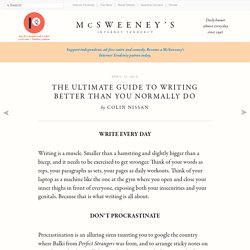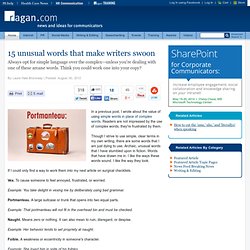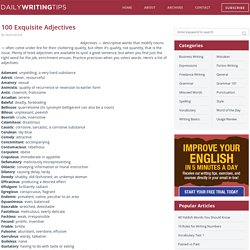

Learn a Language in 10 days. The Ultimate Guide to Writing Better Than You Normally Do. Writing is a muscle.

Smaller than a hamstring and slightly bigger than a bicep, and it needs to be exercised to get stronger. Think of your words as reps, your paragraphs as sets, your pages as daily workouts. Think of your laptop as a machine like the one at the gym where you open and close your inner thighs in front of everyone, exposing both your insecurities and your genitals. Because that is what writing is all about. Procrastination is an alluring siren taunting you to google the country where Balki from Perfect Strangers was from, and to arrange sticky notes on your dog in the shape of hilarious dog shorts.
The blank white page. Mark Twain once said, “Show, don’t tell.” Finding a really good muse these days isn’t easy, so plan on going through quite a few before landing on a winner. There are two things more difficult than writing. It’s no secret that great writers are great readers, and that if you can’t read, your writing will often suffer. Writing. Citefast automatically formats citations: APA 6th edition, MLA 7th ed. and Chicago 16th ed. 15 unusual words that make writers swoon. In a previous post, I wrote about the value of using simple words in place of complex words.

Readers are not impressed by the use of complex words; they're frustrated by them. Though I strive to use simple, clear terms in my own writing, there are some words that I am just dying to use. Archaic, unusual words that I have stumbled upon in fiction. Words that have drawn me in. I like the ways these words sound. If I could only find a way to work them into my next article on surgical checklists. Vex. Example: You take delight in vexing me by deliberately using bad grammar.
Portmanteau. Example: That portmanteau will not fit in the overhead bin and must be checked. Naught. Example: Her behavior tends to set propriety at naught. Foible. Example: She loved him in spite of his foibles. Parvenu. Example: He was treated like a parvenu at the country club dinner. Sentinel. Example: Bennett heard a strange noise and asked the sentinel to stay close. These are the grammar, usage, and style errors seen most commonly in written materials.
100 Exquisite Adjectives. By Mark Nichol Adjectives — descriptive words that modify nouns — often come under fire for their cluttering quality, but often it’s quality, not quantity, that is the issue.

Plenty of tired adjectives are available to spoil a good sentence, but when you find just the right word for the job, enrichment ensues. Practice precision when you select words. Here’s a list of adjectives: Subscribe to Receive our Articles and Exercises via Email You will improve your English in only 5 minutes per day, guaranteed! 21 Responses to “100 Exquisite Adjectives” Rebecca Fantastic list! What Should I Read Next? Book recommendations from readers like you.
20 Common Grammar Mistakes That (Almost) Everyone Makes. I’ve edited a monthly magazine for more than six years, and it’s a job that’s come with more frustration than reward.

If there’s one thing I am grateful for — and it sure isn’t the pay — it’s that my work has allowed endless time to hone my craft to Louis Skolnick levels of grammar geekery. As someone who slings red ink for a living, let me tell you: grammar is an ultra-micro component in the larger picture; it lies somewhere in the final steps of the editing trail; and as such it’s an overrated quasi-irrelevancy in the creative process, perpetuated into importance primarily by bitter nerds who accumulate tweed jackets and crippling inferiority complexes. But experience has also taught me that readers, for better or worse, will approach your work with a jaundiced eye and an itch to judge.
While your grammar shouldn’t be a reflection of your creative powers or writing abilities, let’s face it — it usually is. How to Write Great Articles Using This 7-Point Checklist. Every serious writer wants to write well and know that they are somehow making an impact on their readers.

A writer may be trying to convey an emotion, provide information, describe how to do something, persuade a buyer, or any number of other endeavors. The writer is hoping to move the reader in some way. It may be an emotional movement, as in invoking feelings of joy, humor, anger, or injustice; an intellectual movement, as in having educated them on how to do something better or more efficiently; or a movement to act, as in purchasing a product, and so on. There are several ways to go about reaching an audience, and the best writers always keep in mind the article’s impact on the audience. 100 Exquisite Adjectives. Prettiest Words: A Work in Progress. - StumbleUpon. Free Bibliography Generator - MLA, APA, Chicago citation styles.